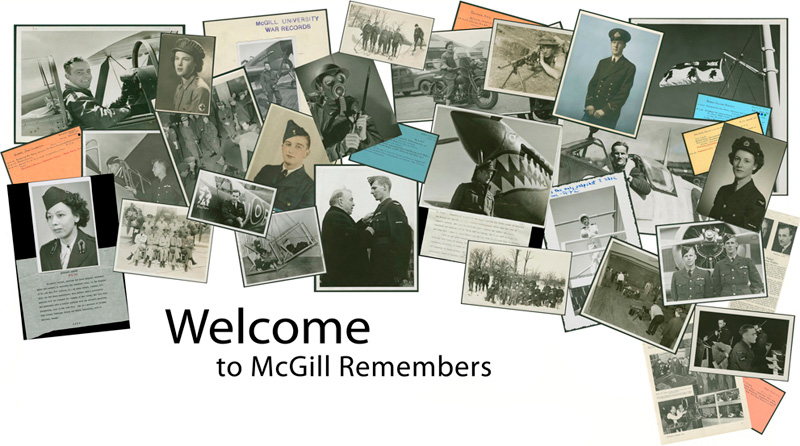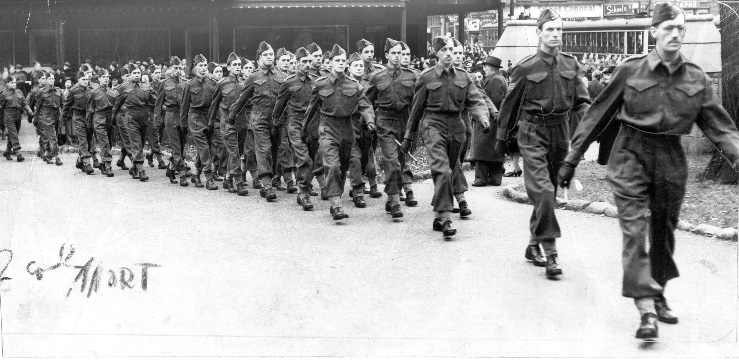
On November 11, Canadians across the country will take a moment to pay tribute to the members of the Canadian Armed Forces who have died in the line of duty. Ceremonies will be held, wreaths will be laid, and many will silently reflect, and give thanks, to the men and women who paid the ultimate sacrifice.
But after the ceremonies end and the skirl of bagpipes fade most of us return to our daily lives. And, if we are being honest, many of us will not think much about such things until the poppies begin to crop up on people’s lapels once again next year.
For Wes Cross and Chris Milligan, however, the desire to remember and preserve these stories of service resulted in something much more substantial and permanent.
The two retired McGillians spearheaded the McGill Remembers project which, beginning in 2005, digitized the McGill University War Records.
“The project grew out of a Faculty of Education research effort to utilize readily available community resources to develop an appreciation for history at the local level,” says Cross, a retired administrator in Student Services and Libraries. “The effort started out at the secondary education level in Montreal, but with the advent of 2005 declared as ‘Year of the Veteran’ in conjunction with the 60th anniversary of the end of the Second World War, Chris and I decided to include McGill as a natural next level in our work.”
Extensive World War II records
Only in operation from 1942 to 1946, McGill’s War Records office nonetheless compiled extensive information on the involvement of faculty, students, alumni and staff engaged in World War II. In all, these archives comprised of some 6,600 index cards and more than 3,000 files containing newspaper clippings, correspondence and hundreds of photographs.
McGill Remembers also recognizes the University’s participation in other conflicts and peacekeeping operations of the 19th and 20th centuries; and gives visitors the opportunity to browse the digital copy of the illuminated Book of Remembrance. People can also learn about the extensive contributions of McGill women, who served with the Canadian Red Cross during the First World War, enlisted in Active Forces during the Second World War, and provided civilian support through organizations like the McGill Women’s Union back home in Montreal.
“There are largely untapped resources at the local levels that historians were beginning to turn to at that time. Newspapers, letters and oral histories can serve as primary sources for new research on old topics,” says Cross. “McGill had preserved an incredibly rich collection of materials on the Second World War and we felt by making this known and available to historians and teachers, new aspects of local, or micro-history, would be revealed.”
The University files for World War I were not preserved at the time, but to mark the 100th anniversary of the end of the Great War, a detailed summary of the 365 fatalities the University experienced has been compiled. This new list will be the subject of the James McGill Society lecture on November 12, to be delivered by Cross.
Growing interest
Neither Cross nor Milligan, a retired professor and former Associate Dean of the Faculty of Education, served in the military, but, as Cross points out “like many of our generation, we have parents who served in World War II.” Milligan’s son Andrew is the Commanding Officer of 283 Air Squadron Canadian Forces Reserves Cadet Cadre.
Cross says that, while the initiative was undertaken to provide historians with accessible records, McGill Remembers enjoys a much larger audience.
“A large amount of satisfaction thus far has been the response from people who come in contact with the material. Schools are using the digital files as classroom resources, historians have contacted us for more documents and background,” he says.
“By far the largest reward has been the appreciation of veterans and their families who did not realize that McGill monitored their contributions so closely,” Cross continues. “The response from European institutions, media and individuals has been also very positive. Our project has been featured by Canadian and European media who use our project to tell the Canadian contributions from the point of view of individual stories.” In 2014, the McGill Remembers project received a Minister of Veterans Affairs Commendation.
The project is about keeping alive the stories of those men and women who lost their lives too young, preserving their memories for future generations, says Cross, “Beyond recognizing the tremendous effort and sacrifice that the Great War entailed, it is also a chance to tell these stories from so long ago and make them available to the public so that the appreciation of their contribution will continue beyond this anniversary.”
Visit the McGill Remembers website

McGill Archives, PR001371
